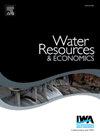Sustainable seasonal land fallowing policy to combat groundwater overdraft in China: Insights from a choice experiment
IF 1.9
3区 经济学
Q2 ECONOMICS
引用次数: 0
Abstract
The Seasonal Land Fallowing Policy (SLFP) is conducted in the North China Plain to address severe groundwater overdrafts. Optimal compensation standards, fallow duration, and reallocating the saved labor to other employment may enhance SLFP's economic sustainability, while planting green manure crops on fallow land promotes its ecological sustainability. However, unclear farmers' preferences for these policy attributes and supporting measures hinder policymakers from implementing more sustainable SLFP schemes. Based on a choice experiment survey with 716 farmers in Hebei province, our estimation indicates that farmers prefer an SLFP scheme with higher compensation, longer fallow durations, and employment support, but are reluctant to plant green manure crops. Based on the results, the compensation level can be reduced from 500 yuan/mu/year to 460 yuan/mu/year if the current SLFP scheme continues to be implemented. More economically and ecologically sustainable SLFP schemes can be achieved with longer fallow durations and the provision of employment support. Additionally, this study explicitly explores the heterogeneity of preferences for the SLFP scheme between small-scale and large-scale farmers in China and proposes differentiated SLFP schemes for each group.
中国应对地下水透支的可持续季节性土地休耕政策:来自选择实验的见解
为解决华北平原地下水严重超采问题,实施了季节性土地休耕政策。最优的补偿标准、休耕时间和节省劳动力的再配置可提高农田农业的经济可持续性,而在休耕土地上种植绿肥作物可提高农田农业的生态可持续性。然而,不明确的农民对这些政策属性的偏好和支持措施阻碍了政策制定者实施更可持续的SLFP计划。基于对河北省716名农民的选择实验调查,我们的估计表明,农民更倾向于补偿更高、休耕时间更长和就业支持的SLFP方案,而不愿意种植绿肥作物。根据研究结果,如果继续实施目前的SLFP方案,补偿水平可从500元/亩/年降至460元/亩/年。通过延长休耕期和提供就业支助,可以实现经济上和生态上更可持续的SLFP计划。此外,本研究明确探讨了中国小规模和大规模农民对SLFP方案偏好的异质性,并提出了不同群体的差异化SLFP方案。
本文章由计算机程序翻译,如有差异,请以英文原文为准。
求助全文
约1分钟内获得全文
求助全文
来源期刊

Water Resources and Economics
Environmental Science-Water Science and Technology
CiteScore
5.00
自引率
0.00%
发文量
17
审稿时长
51 days
期刊介绍:
Water Resources and Economics is one of a series of specialist titles launched by the highly-regarded Water Research. For the purpose of sustainable water resources management, understanding the multiple connections and feedback mechanisms between water resources and the economy is crucial. Water Resources and Economics addresses the financial and economic dimensions associated with water resources use and governance, across different economic sectors like agriculture, energy, industry, shipping, recreation and urban and rural water supply, at local, regional and transboundary scale.
Topics of interest include (but are not restricted to) the economics of:
Aquatic ecosystem services-
Blue economy-
Climate change and flood risk management-
Climate smart agriculture-
Coastal management-
Droughts and water scarcity-
Environmental flows-
Eutrophication-
Food, water, energy nexus-
Groundwater management-
Hydropower generation-
Hydrological risks and uncertainties-
Marine resources-
Nature-based solutions-
Resource recovery-
River restoration-
Storm water harvesting-
Transboundary water allocation-
Urban water management-
Wastewater treatment-
Watershed management-
Water health risks-
Water pollution-
Water quality management-
Water security-
Water stress-
Water technology innovation.
 求助内容:
求助内容: 应助结果提醒方式:
应助结果提醒方式:


